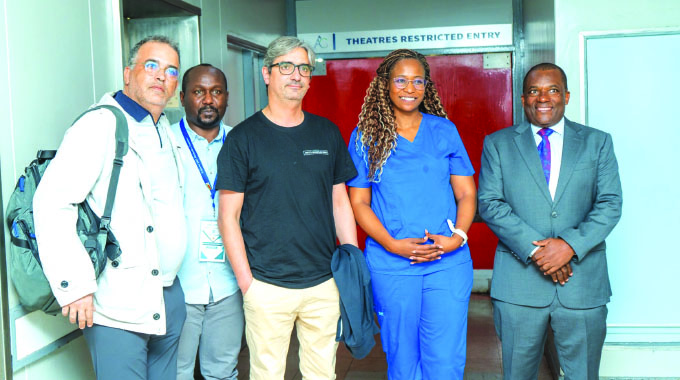|
Getting your Trinity Audio player ready…
|
The 40-year-old mother of three who on Tuesday was one of the first three patients ever to be operated on in Zimbabwe using uniportal video-assisted thoracic surgery (VATS) has had a long battle with cancer.
She is the first person in Zimbabwe to have this operation using uniportal VATS, a technique developed by Spanish Professor Diego Gonzales Rivas who led the operating team made up of himself, Dr. Kudzai Kanyepi, Dr Simukai Machawira and Dr Wilfred Mutewere, all of whom are cardiothoracic surgeons.
The operation at The Avenues Clinic, which involved the removal of the lower lobe of one of her lungs in which cancer had been detected, was carried out through a single small incision guided by what the surgeons could see on a video monitor. It was the only one of the three surgeries carried out using this procedure that involved lung cancer, the professor said.
An operations manager at a local company, she has asked not to be named to protect her privacy.
Her first diagnosis of cancer was in 2008 when it was discovered that she had breast cancer. She underwent surgery to have the breast removed and reconstructive surgery as well as chemotherapy. She was pronounced clear of cancer as it appeared the cancer had not spread.
However, seven years later in 2015, she felt a lump in the remaining breast. Once again it was confirmed to be cancer and she had a second mastectomy to remove that breast. Both operations were carried out in South Africa.
In 2021 she felt lumps in her armpit. An axillary dissection was done at The Avenues Clinic to remove lymph nodes from her armpit. She had follow-up chemotherapy and radiotherapy up until 2022.
Every year she had a CT scan to make sure there were no recurring signs of cancer. The last time she had a scan there was something discovered in the lung, which a biopsy confirmed was cancer.
Because it was discovered early the prognosis was good, she said. This was the lung on which she had the surgery on Tuesday. She remains amazingly positive after so many instances of cancer and so many treatments.
“It’s a bit of shock when you are first diagnosed with cancer but then you just decide to get on with it and have done what needs to be done. My family was very supportive,” she said.
“Each time I had chemo I lost my hair but it grew back after the chemo was finished. Chemo is an unpleasant experience. People handle it differently. It’s hard to go through it but when you do it you do it. You are down for a couple of days after the chemo cycle is finished but then you can get back to normal life,” she said.
She said she thought it was important for people to have regular check-ups and tests. If she had not had a CT scan the lung cancer would not have been discovered, because she feels and looks healthy. When detected early it is easier to deal with.
She expressed her appreciation for the care and kindness she had found at The Avenues Clinic.
She was one of three patients who were operated on at the end of the International Uniportal VATS Masterclass Zimbabwe programme attended by doctors from across Africa. The other two patients were operated on at Parirenyatwa Hospital.
Uniportal video-assisted thoracic surgery involves operating through a single small incision guided by video from a small camera lowered into the chest through the same incision.
These operations were the first video-assisted thoracic surgeries through a single small incision to be carried out in Zimbabwe. Her operation was the first in which part of the lung was removed.
What made the operations unique for Zimbabwe was the extent of the surgery and the fact that only a single small insertion was made through which the operation was carried out.
The operations were all a success, with all three patients up and about the following day, according to Dr Kanyepi, who not only participated in the operations but played a major role in organising the programme, having visited Professor Diego Gonzales Rivas at his Shanghai training facility and discussed with him conducting a Masterclass in Zimbabwe.
Among the major sponsors of the programme was Cimas Health Group, which provided US$ 3,000 towards its cost. The patients were treated for free.
Dr Kanyepi, whose training was sponsored by the Cimas Health Education Fund, is the first and only female cardiothoracic surgeon in Zimbabwe.
The Cimas Health Education Fund (CHEDU was established in 2007 to contribute to the development of human resources in Zimbabwe’s health sector.
Since then the fund has helped address the healthcare sector’s skills shortage by sponsoring the training of specialists in various medical fields, including internal medicine, neurology, orthopaedics, radiology, paediatrics, haematology, histopathology and surgery.
The benefits for the patients of video assisted thoracic surgery rather than open thoracic surgery include less post-operative pain, less blood loss and a lower risk of complications, as well as a shorter stay in hospital, faster recovery and less scarring.
With open surgery there is normally an incision 10 to 15 centimetres long, Dr Kanyepi said. With the single incision used for Tuesday’s operations, there will be no more than one small scar.
Carrying out surgery inside the chest when able to only see what is going on by looking at a video screen requires special training. Doing so through a single incision is even more challenging, particularly where extensive surgery is concerned.
Dr Kanyepi said there were plans to make such programmes an annual event where surgeons from across the continent can be trained and carry out or witness live surgery such as that carried out at the Avenues Clinic and Parirenyatwa Hospital on Tuesday.
